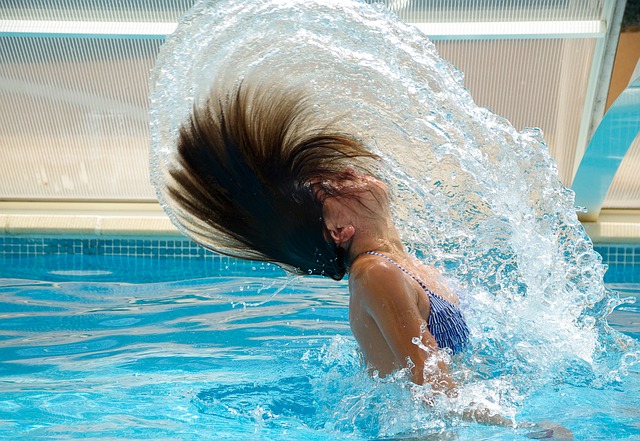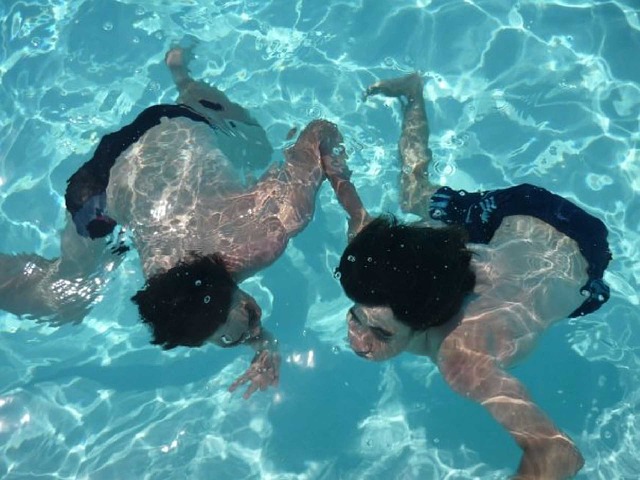Anyone who swims in a chlorinated pool needs to look for ways to minimize the damaging effects of chlorine exposure. In this post, I will share ways to protect yourself from the harmful effects of chlorine, inside and out.
Swimming is such an awesome year-round activity. It’s especially hard to pass up a cool dip in the heat of summer.
And, unless you are in Europe, this usually means swimming in a pool laced with chlorine, bromine or chloramines. These chemicals are very caustic and oxidative to our cells.
I will go out on a limb to say that protection from these chemicals needs to be a higher priority than protection from the sun.
That statement will likely bring on some heat, but I will stand by it. And, here’s why!

Sun protection often comes through (highly toxic) sunscreen, adding an even greater burden to your body. (Unless it’s a product with these types of ingredients.) And, we need ALL need a healthy dose of sunlight for Vitamin D production. That’s a fact.
Get this: There is NO biological need for chlorine.
Zip! Zero!
In fact, studies clearly show that chlorine is very caustic, and increases your risk for cancer. [1] [2]
Caustic–able to burn or corrode organic tissue by chemical action.
This means that it deteriorates whatever it touches. This includes your cells, your DNA, your body!
YOUR health!
When I was three years old, my swimming instructor told my parents that I was her “little fish.”
This first made me cry. I can only guess, but at age 3, I may have thought:
People catch and eat fish.
“I not a fish, I a Jennifer,” I replied to my mother, who asked what had upset me after swimming lessons.
My mom chuckles, telling this story over the course of my life. She knew that my teacher was proud that I swam around the pool while my older siblings hugged the sides in fear. My little heart didn’t realize it was a compliment.

Swimming is a fundamental safety skill.
I went on to teach hundreds of children water safety skills and how to swim. Needless to say, this “fish” spent decades connected to a pool in many ways.
I cannot over overlook this chemical exposure.
The way my body responds to chlorinated water today speaks volumes to the damage I suffered from those early years.
Studies have shown an increase in cancer rate when exposed to chlorine. It has a strong oxidation effect on everything it touches.
Oxidation is NOT good, which is why physicians encourage the consumption of high antioxidant foods and supplements.
Yet, foods are not enough to counteract the chemical culture of today. Chlorine (Fluorine & Bromine) exposure causes premature aging, interferes with thyroid function, and more!
Swimming in a chlorinated pool (this includes chloramine and bromine) exposes you to off-gases that rise up from the surface of the water. Inhalation of caustic substances goes right to your brain.
Chloramines and Bromine are even more aggressive and damaging to your health.

How can you minimize your chlorine and chemical exposure, and still swim?
Realizing that people in the United States of America, will be exposed to chlorine while swimming in pools, this goal is clear. Help our cells resist the damage from chemicals.
Ways to Minimize the Effects of Chlorine from Swimming Pools
1] Rinse off — SIMPLE
Before: Before you get into the pool, rinse your body to hydrate your skin. It will theoretically absorb less chlorinated water. Chlorine is very active, it gets on our skin, and immediately starts to do damage.
After: As soon as you get out of the pool, immediately rinse off (with soap is best). This is a good practice, but know that most of the chlorine has already changed into something else. The damages happened while in the pool water.
2] Vitamin C — Ascorbic acid (aka vitamin C) neutralizes chlorine and chloramines. And, THAT is a wonderful thing. You can not eat enough fruit or veggies to get the levels needed to protect your body from modern-day chemicals. And, no traditional population ever ate fruit year around. It simply was not available, and to do so, exposes your body to too much fructose.
Topically: It’s debatable as to whether a topical application of Ascorbic Acid is beneficial after you get out of the pool. By then, chlorine has already started to do damage inside of your body, and has turned into something else.
Orally: Swimmers or children who spend time in a chlorinated pool need to take a minimum of 4000 mg of Vitamin C. It is best to take with breakfast, lunch and dinner because Vitamin C does not stay in your body all day. Bare minimum, take 2000 mg with breakfast and then with dinner.
3] Vitamin E — Vitamin E is a fat soluble vitamin needed for all of our body’s systems. It’s also difficult, if not impossible, to acquire all that you need daily through the Standard American Diet. Some benefits of Vitamin E include cardiovascular health, helps prevent scar tissue production, and bypass obstacles created by hardened arteries and clots, protects cells from toxicity damage, eyes, nerves, and so much more. Get you some Vitamin E.
According to Dr David Getoff, this is best Vitamin E supplement on the market.
4] Vitamin D — You should have your Vitamin D levels checked by your physician. According to Dr Joseph Mercola, your levels need to be higher than the US Standards to protect against a lot of the cancers, which chlorine, chloramines and bromine promote. This usually requires supplements, especially in the winter months.
5] Eat Full-fat food— Fats help to protect your cells from toxins, including those in your brain. You are doing your body more damage when you consume foods with less fat than the way God created them. Healthy fats in cells protect against oxidative damage that occurs not just from chlorine, but from other oxidative stressors that we encounter.
*If you want to hurt yourself MORE when you go into a pool, eat a relatively low fat diet. (Dr David Getoff)
6] Iodine –Iodine is a helpful and necessary halogen. When at proper levels, iodine will displace most other halogens for its battle for our Thyroid. The US population has much lower levels of iodine compared to other cultures who consume seaweed and fish on a daily basis. When our iodine levels are healthy, it prevents chlorine and bromine from taking up residence in the thyroid, wrecking all kinds of havoc on your health. (Fluorine presents issues of its own.)
Depending on the science you believe, Dr. Jorge Flechas determined that the average dietary intake of iodine for Japanese women is 13.8 milligrams (mg) per day. He recommends 12.5 mg/day, especially for his pregnant patients to optimize their child’s intelligence. (Some physicians recommend much lower levels, yet I strive for Flechas’ recommendation, and feel better when I do.)
DIY Iodine Patch Test
- Use an orange Iodine solution
- Paint a 3X 3-inch square on your inner thigh, inner forearm or stomach.
- Allow it to dry
- Observe the patch over the next 24 hours for color changes.
If the patch remains for 24 hours or longer, your Iodine levels are sufficient.
If the patch disappears or mostly disappears in less than 24 hours, you have some degree of deficiency.
If your patch is significant lighter or disappears in less than 18 hours, this could indicate moderate to severe iodine deficiency, and the need for supplementation.
You can increase your Iodine intake through supplements, through consuming iodine-rich foods, such as eggs, fish, sea vegetables and iodized salt, or by simply applying iodine to your skin at night. I particularly like the bottoms of my feet where the big toe meets the foot–the Vitaflex point for the thyroid.
Note: When you first add Iodine to your diet, you may experience a detox reaction.
7] Alpha lipoic Acid — ALA is a fat and water solvent antioxidant that protects liver, helps donate electrons to regenerate other antioxidants. Consume this daily, especially when exposed to chlorine and chemicals from the pools or hot tubs.
8] Probiotics – Chlorine kills bacteria. This includes the vital probiotics in your gut. Everyone needs to eat fermented foods daily and/or take an effective probiotic. Every. Single. Day. Especially when exposed to chlorine, or chemicals that kill off the good bacteria in your gut.
9] Bentonite Clay — Bentonite Clay has a unique ability to produce an “electrical charge” when water is added. Clay’s ability to absorb toxins, heavy metals, impurities, and chemicals.
Personal Experience: Several years ago, I took a bentonite clay bath for the first time. While in the bath, I smelled chlorine. (The water I bathed in was not chlorinated water.) This spoke volumes to me in regards to the ability of clay to draw toxins from my body.

Alternatives to Chlorinated Pool
There are a few safer swimming pool options for your home.
Ozone filtration – Ozone is an activated oxygen, and this type of filtration system is used all over Europe. It combats pathogens more effectively than chlorine, or its more caustic counterparts. Many companies in the USA do not offer quality ozone systems. They have historically generated too little ozone than what the amount of water requires. This can lead to adding in chlorine or bromine. This company offers the most effective unit available in the USA.
If you have had a positive experience with another company, please share below in the comments.
Grander Water – This system involves a stainless steel box, which contains a special water treated for over a year in Austria. The water passes through this stainless steel box, and it changes the quality of water. The energy it imparts into the water makes unfriendly to bacteria, etc.
It reduces the damaging effects of harmful products in the water. The amount of chlorine necessary drops 25-30%. Because of lower pathogen levels, you need much less chlorine in your pool water. Go to their site to learn more.
Wrap Up
There is nothing, NO-THING that is “organic” about a traditional, American swimming pool.
If you are blessed to have access to an ozonated swimming pool or a fresh swimming hole, SWIM THERE! That is as organic as you can get.
I do understand that you and your family want to swim. Please take the steps to protect your cells, your body from this additional oxidative stress. Consider the ways to minimize effects of chlorine exposure from swimming pools.
And, thank you for visiting my blog.
Note: Some links on this site represent affiliate programs, but some do not. I strive to only suggest the best products and supplements to my readers, whether I receive commissions, benefits or not.
Jennifer L Griffith is a Licensed Louisiana Realtor who is readily available to help you with your Real Estate needs. Reach out here!


Leave a Reply
You must be logged in to post a comment.